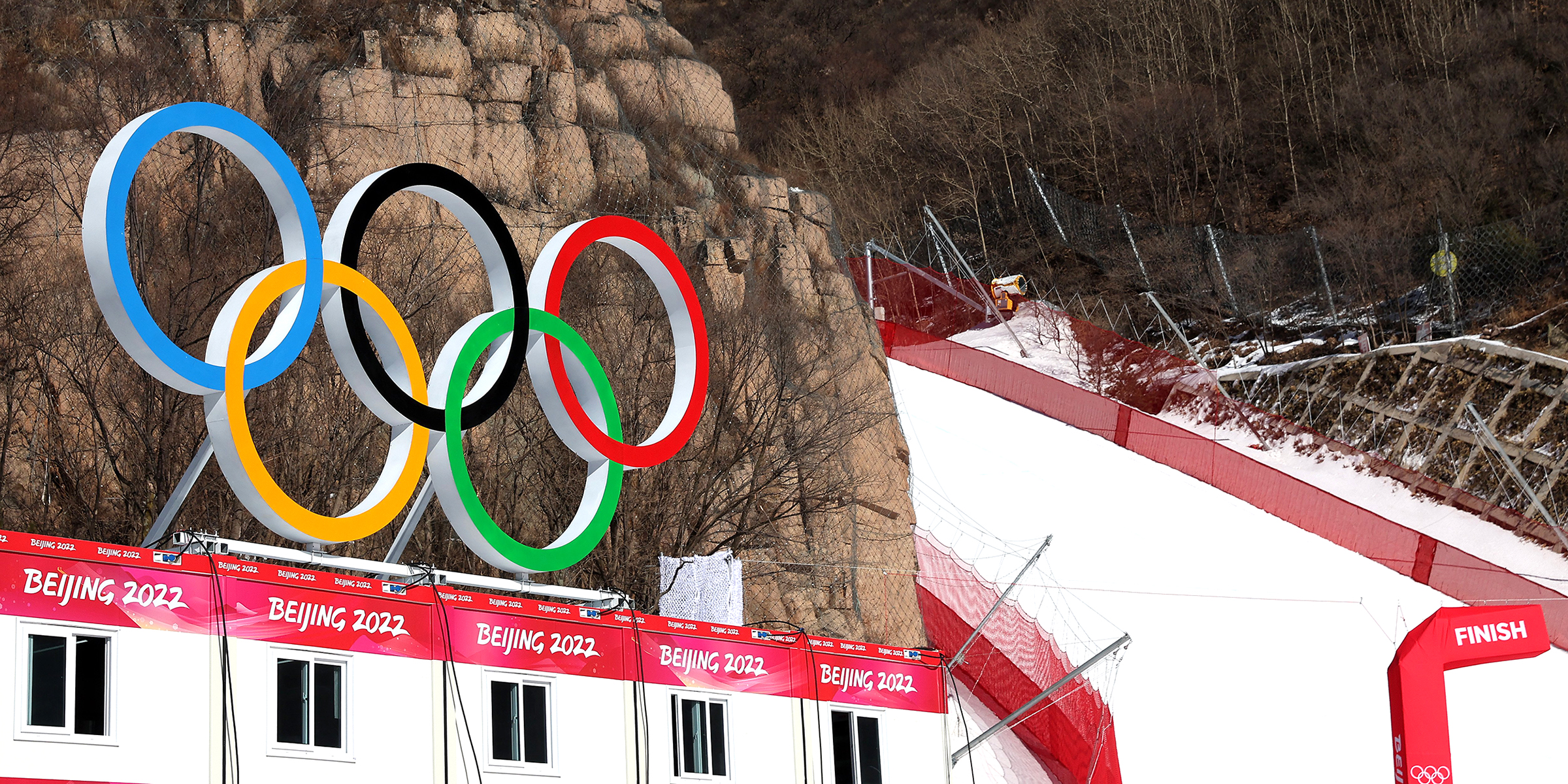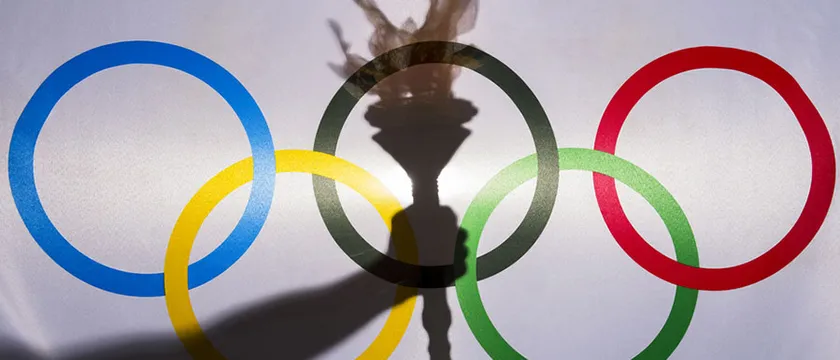The main symbols of the Olympic Games include the rings, the flag, the emblem, the oath, the motto, the anthem and the fire with the relay.
TASS-DOSIER. On July 23, the XXXII Summer Olympic Games will open in Tokyo (Japan).
TASS talks about the Olympic symbols.
The main symbols of the Olympic Games include the Olympic rings, the flag, the emblem, the oath, the motto, the anthem and the Olympic flame with its relay.
Olympic rings
The Olympic symbol consists of five interlaced rings. It can be used as a single color version, or a combination of blue, yellow, black, green and red. It was proposed in 1913 by the Frenchman Pierre de Coubertin, who was the initiator of the modern Olympic Games. According to the Olympic Charter, the symbol represents the unity of the five continents (Africa, Europe, South and North America, Asia, Australia with Oceania) and the meeting of athletes from all over the world during the Games.
Flag
The flag, which is a white cloth with the Olympic symbol in the center, was raised during the Olympic Congress, held in June 1914 in Paris (France). This event was timed to coincide with the 20th anniversary of the modern Olympic movement. In 1894, the first Olympic Congress was held in Paris, the first modern Olympics was held in 1896 in Athens (Greece). For the first time as an attribute of the Olympic Games, the flag appeared in 1920 in Antwerp (Belgium).
Emblem
The Olympic emblem consists of the traditional five rings, as well as the symbol of the city or state hosting the Games, or some other image. As a rule, the year and place of the Games are indicated.

The oath
The Olympic oath, the text of which was also developed in 1913 by Pierre de Coubertin, was first heard in 1920 in Antwerp. She was voiced by Belgian fencer Victor Boyne. Since then, according to the established tradition, the oath on behalf of all Olympians was pronounced at the opening of the Games by the athlete of the host country. Its text has changed several times. Until 2018, the option that was proposed in December 1999 and presented in 2000 during the opening of the XXVII Summer Olympics in Sydney (Australia) was valid: “On behalf of all athletes, I promise that we will participate in these Olympic Games, respecting and observing the rules by which they are held, without the use of doping and any drugs, in a truly sporting spirit, for the glory of sport and in the name of the honor of their teams.”
In 1968, the International Olympic Committee (IOC), at the suggestion of the USSR Olympic Committee, included the Olympic oath of judges in the opening ceremony of the Games, and in February 1972 it became part of the opening ceremony of the Winter Olympics in Sapporo. For the first time in the history of the Summer Games, the oath of the judges was pronounced in August 1972 in Munich (Germany). It was said by the German equestrian judge Heinz Pollai: “On behalf of all judges and officials, I promise that we will carry out our duties at these Olympic Games with complete impartiality, respecting and observing the rules by which they are held, in a truly sporting spirit” .
Since the 2012 Summer Games in London, UK, the coaches’ Olympic oath has also been recited. Then it was said by British specialist Eric Farrell, who works with rowing athletes: “On behalf of all coaches and other people from the environment of athletes, I promise that we will behave in such a way as to maintain sportsmanship and fair play, in accordance with the basic principles of the Olympic movement “.
In September 2017, the IOC changed the regulations regarding the Olympic oath. At the XXIII Winter Games, held in 2018 in Pyeongchang (Republic of Korea), the three mentioned oaths were combined into one in order to shorten this stage of the opening ceremony. The representative of each of the three groups said the phrase: “On behalf of the athletes”, “On behalf of all judges” and “On behalf of all coaches and officials”. After that, one of the athletes voiced the text of the common oath: “We promise that we will participate in these Olympic Games, respecting and observing the rules by which they are held, in a true sporting spirit. We are committed to sport without doping and deception. We do it for the glory sport, in the name of the honor of their teams and with respect for the fundamental principles of Olympism.”
In July 2021, it became known that the IOC changed the text of the Olympic oath, adding words about equality and non-discrimination: “We promise that we will participate in these Olympic Games, respecting and observing the rules by which they are held, in the spirit of fair play , inclusion and equality. We are committed to sport without doping, cheating or discrimination of any kind. We do this in the name of the honor of our teams, respecting the fundamental principles of Olympism and in order to change the world through sport for the better.” At the same time, the phrases “On behalf of the athletes”, “On behalf of all judges” and “On behalf of all coaches and officials” will be spoken in Tokyo not by three people, but by six: two athletes, two judges and two coaches. Each pair will be represented by a man and a woman.
Motto
The original Olympic motto – “Faster, higher, stronger” (lat. “Citius, altius, fortius”) – was also proposed by Pierre de Coubertin. The authorship of the phrase belonged to the Dominican priest Henri Didon, colleague of de Coubertin in the revival of the Games. The motto was approved by the first Olympic Congress, held in 1894 in Paris, but began to be used from the 1924 Paris Olympics.
On July 20, 2021, at the 138th session of the IOC in Tokyo, a new Olympic motto was approved – “Faster, higher, stronger – together” (lat. “Citius, altius, fortius – communis”).
The unofficial motto of the Games is the phrase “The main thing is not victory, but participation.” It was introduced by de Coubertin, but it was the American Bishop Ethelbert Talbot who first said these words in connection with the failure of the Italian runner Dorando Pietri at the 1908 Olympics in London. The athlete who took first place in the marathon race was disqualified due to outside assistance provided to him at the finish line.
Mascot
The Olympic mascot first appeared at the Winter Games in Grenoble in 1968. It was a figurine of a skier named Schuss (the name coincided with the name of one of the types of descent in alpine skiing). The mascot of the 1968 Summer Games in Mexico City (Mexico) was the Red Jaguar. It was created on the basis of the coloring of a stone throne in the form of a roaring beast, discovered during archaeological excavations in Chichen Itza, the ancient capital of the Maya.
In 1972, the concept of “Olympic talisman” was officially enshrined, and the first universally recognized mascot of the Summer Games was Waldi’s dachshund, who met participants and guests of the Olympics in Munich. According to the decision of the IOC, the image of a person, an animal or a fabulous creature can become a mascot. The procedure for choosing a mascot is not regulated, the decision is made by the organizers of the Games.

Hymn
The Olympic anthem was first played in 1896 at the opening ceremony of the first modern Olympics in Athens (Greece). A choir of 150 people performed a cantata written by the Greek opera composer Spyros Samaras to the words of his compatriot, the poet Kostis Palamas. The authors of the music and words of the main song of the Games were chosen by the first President of the IOC – the Greek Demetrius Vikelas. In subsequent years, the anthem was created by representatives of the host country of the Games, but in 1958 the IOC declared the composition of Samaras and Palamas the official Olympic anthem. Since the 1960 Winter Olympics in Squaw Valley (California, USA), it has been played during the opening and closing ceremonies of the Games – when the Olympic flag is raised and lowered. As a rule, the anthem is performed in the official language of the host country, but there were exceptions – instrumental versions, performance in Greek, as well as in two languages: in Greek and in the language of the host country.
Olympic flame and its relay
The Olympic flame, symbolizing peace and unity, is one of the main ceremonial elements of the modern Olympic Games. For the first time after the renewal of the tradition of holding the Olympics, he appeared at the IX Summer Games of 1928, held in Amsterdam (Netherlands).
The Olympic torch relay was first held in 1936 on the eve of the Summer Games in Berlin (Germany).
Currently, the lighting of the Olympic flame in Greece is a traditional event that precedes the relay races of the summer and winter Games. As a rule, the ceremony is performed by actresses depicting ancient Greek priestesses. One of them lights a fire using a parabolic mirror that focuses the sun’s rays. Then, for several months, his relay race takes place, ending on the opening day of the Games with the lighting of a special bowl in the host city of the Olympics.
